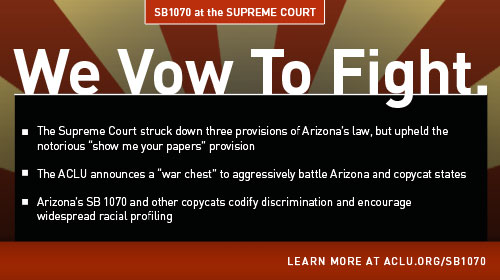
The Supreme Court handed down a mixed decision Monday for Arizona and the handful of states that have copied its anti-immigrant law, SB 1070. Striking down three of the four provisions at issue in Arizona v. United States, the Justices affirmed the federal government’s exclusive role in enforcing immigration law. On the one hand, the Court delivered a significant rebuke to legislators who tried to make being an undocumented immigrant a crime. But on the other hand, the Court let stand the discriminatory “show me your papers” provision, or Section 2(B). And while it’s true that the Court sent a warning that Section 2(B) could still be ruled unconstitutional based on pending challenges (by the ACLU and other civil rights groups) focused more directly on racial profiling and prolonged detention, it nevertheless has thrown Arizona and other states into chaos by reversing the lower courts’ decision to block the “show me your papers” law. Arizona officials immediately announced that they would begin enforcing Section 2(B), even though the Supreme Court’s ruling does not immediately lift the order blocking. The Court’s decision now sends the case back to the lower district court in Arizona for further proceedings.
Section 2(B) requires law enforcement to verify individuals’ immigration status based on “reasonable suspicion” that they are not in the country lawfully. The intent of this provision (and the rest of SB 1070) is “attrition through enforcement”— trying to force immigrants to leave the state through harassment, intimidation and fear. Once in effect, the harmful consequences of this provision will be apparent immediately. As we’ve seen in Alabama, the only state in which a “show me your papers” law has gone into effect, racial profiling becomes rampant and discrimination widespread. There is simply no way to enforce this provision without relying on stereotypes and targeting individuals based on how they look and sound.
Echoing that concern Monday, President Obama said, “No American should ever live under a cloud of suspicion just because of what they look like. Going forward, we must ensure that Arizona law enforcement officials do not enforce this law in a manner that undermines the civil rights of Americans, as the Court’s decision recognizes.”
In response to the Court’s decision, the ACLU announced that it had amassed a war chest of nearly $9 million dollars to continue the legal fight against S.B. 1070 and similar laws that have been passed in Alabama, Georgia, Indiana, South Carolina and Utah. The ACLU also pledged to fight anti-immigrant legislation in state legislatures across the country.
So, what’s next? The ACLU and its allies will be back in court in Arizona and elsewhere proving that S.B. 1070 and its copycats are unconstitutional because they cannot be enforced without violating our basic civil rights. We have seen enough of immigration enforcement by local law enforcement agencies in Arizona to know that is true. Monday’s Supreme Court decision only strengthens those arguments.
We will also be gearing up for the legislative battle ahead in states that may be considering enacting their own laws. We are confident on this front. Even before Monday’s decision, policymakers and lawmakers have rejected immigration policy modeled after SB 1070 with increasing frequency after witnessing the harms these laws have had on state’s reputations, as well as the devastating economic consequences. With laws like Arizona’s in effect, crops rot, businesses suffer and communities turn against each other out of fear and suspicion.
On the federal level, we will be pressing the Obama administration to fulfill its promise that immigration enforcement does not become a pretext for discrimination in Arizona and elsewhere.
After the Court’s decision this week, our task is clear. We will be in the courts, the legislatures, and in the public eye to prove once and for all that these laws are bad policy and fundamentally unconstitutional.
Learn more about immigrants' rights: Sign up for breaking news alerts, follow us on Twitter, and like us on Facebook.





